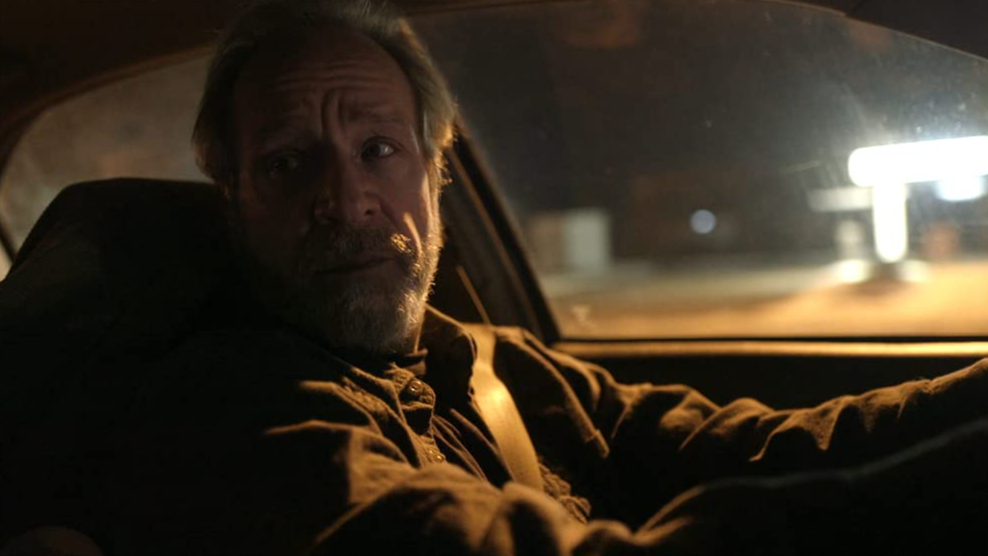A traveling salesman, a hitchhiker, a cheating wife, a murder. Did the salesman kill his wife or not? These tropes are ingrained in the film noir genre. Much like Walter Neff giving his confession of insurance claim fraud and murder via Dictaphone in the 1944 film Double Indemnity, the main character in Kyle Dunbar’s short film Mute (2021) gives his to a priest obfuscating possible guilt with the use of a patsy. Or is he telling the truth?
“Father, I may have committed a terrible sin.”
And with those words, Mute signals it’s the type of Stephen King story that eschews overt monsters and supernatural forces to focus on the horror of humanity. Dunbar keeps his adaptation pretenseless, slyly raising questions on the balance of consequence and guilt, an all too frequent dilemma.
Based on a 2007 King story originally published in Playboy, Mute is a seemingly straightforward tale of a man, Monette (Andrew Bee), seeking Penance from a priest (Christian Tribusxio). Confession becomes a framing device as we intercut scenes of Monette raging to a deaf-mute hitchhiker (Alexandre Stoupenkov) about his failing marriage versus the story he tells the priest.
Monette pays an unannounced visit to the house of the aforementioned priest to give a confession of sins because his wife and her lover were murdered. While driving from what we can assume was a sale, boxes of books sliding around in the backseat, and a St. Christopher medallion hanging from the rearview mirror, he picks up a hitchhiker and shares his marital problems with him. Monette fears the hitchhiker wasn’t a deaf-mute like his battered cardboard sign read. Is it all distortion of truth to bolster up an alibi?
This essentially one-person film is anchored by Andrews Bee’s performance that oscillates between detached and frenzied vital to the character. Having only seen him in non-speaking background roles, such as a 2017 episode of Kim’s Convenience or the 2016 film Suicide Squad, Mute demonstrates he could grow into a great character actor given ample material to work with. Bee’s hangdog appearance enhances the slow burn of the character, and the director’s use of crosscutting between literal and figurative confessions hint that Monette is possibly unreliable. Dunbar has directed 11 short films so far and has a style that evokes the type of King movie popular in the 1980s without outright mimicry. The key piece keeping Mute from being a great adaptation instead of merely good was the priest. He and the hitchhiker are flat characters, by necessity, but he also represents the audience; however, his portrayal implies naivete, perhaps without intending to. Despite squeezing a 34-page short story into a 23-minute film, Dunbar wisely decided to emphasize the ambiguity of Monette’s character.
Without doubt, Dunbar’s choices as a filmmaker go a long way toward creating a piece that works more often than not. Roman Lapshin’s cinematography recalls the work of renowned director of photography Mark Irwin, ASC, CSC on another Stephen King adaptation, Dead Zone (1983). Mute replaces the confession booths from the short story with scenes of the priest. Medium close-up shots are used the majority of the time to convey a feeling of claustrophobia. Nathaniel Reynolds-Welsh’s score, which uses an eerie yet playful theme reminiscent of Angelo Badalamenti’s work on Twin Peaks (1990-1992), also focuses on the sound of the car moving and silence to complement the instability of the main character. This use of imagery and sound alludes to the 1980s without succumbing to overt nostalgia. Its well-lit, almost TV-movie-like appearance belies something repulsive beneath. Combined with Rebecca Callender’s editing, this film effectively translates King’s film noir take on the vanishing hitchhiker urban legend into an economic character study of desperation.
Although Mute succeeds as an adaptation of the short story, altering elements to streamline it for the medium, I couldn’t help but wonder what Dunbar might have done with the premise. Neither did he make it his nor did he try to conceptualize it as a metaphor for current events. In this story, a balance between pretext and subtext serves as a core theme. Due to its status as part of the Stephen King Dollar Baby program, this short film has inherent limitations that few filmmakers are able to overcome. The story is more grounded in reality and focuses on a single character, so it had more freedom to explore its themes since the budget wouldn’t be as big of a constraint. Despite this, the film is an intriguing watch thanks to the ambiguity woven into the story’s conceit and Bee’s striking performance.
During the time I first watched the film, the case for the Kenosha unrest shooting was pending progress and the verdict was still days away. Unlike Joel Schumacher’s Falling Down (1993), which was filmed during the 1992 Los Angeles uprising, Mute was not completed during the trial, therefore its influence can’t be properly attributed to an editorial take on manipulation by supposed victims. The experience may have unfairly influenced my viewing of the film, but it also served as a catharsis. After all, it is easier to deal with an unreliable narrator in fiction than in the real world.
Author Biography
Constantine Frangos is currently an undergraduate student studying English and History at Rutgers University – Camden. He is also a programmer for the yearly Reel East Film Festival.
Film Details
Mute (2021)
Canada
Director Kyle Dunbar
Runtime 23 minutes
Based on Stephen King’s short story from the collection Just After Sunset (2008).








































